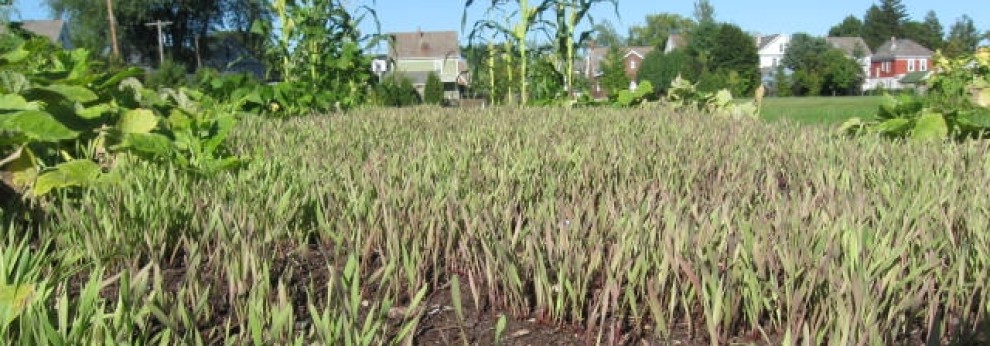 Okay, there’s nothing Biblical about the plagues in our gardens in recent weeks. But a succession of troubles makes it tempting to wonder if we’re being punished for something. Plants have disappeared, have been uprooted and show signs that garden visitors think we’re sharing!
Okay, there’s nothing Biblical about the plagues in our gardens in recent weeks. But a succession of troubles makes it tempting to wonder if we’re being punished for something. Plants have disappeared, have been uprooted and show signs that garden visitors think we’re sharing!
So we have been scrambling to configure means of keeping pests out. But before we spend too much time wringing hands and lamenting our bad fortune, it’s worth mentioning that some of the probable explanation actually reflects a positive development from an educational point of view.
A small measure of wildlife has returned to the space where Myers Middle School was built 15 years ago, positioning the school to help address, even if only ever so slightly, one of the serious scourges in modern childhood and adolescent development – nature deficit disorder.
What is that, you say? And is it a real thing? Well, nature deficient disorder was not identified by anyone in the medical or science community. Rather, the term was coined by journalist Richard Louv and introduced in his 2005 book “Last Child in the Woods: Saving Our Children from Nature-Deficit Disorder,” where he chronicles accelerating disconnect from nature and argues that disconnect is taking a huge toll in physical and mental health.
But academic research that supports the general idea has been piling up ever since. And there is enough of it that we would suggest educational leaders ought be boning up on the disorder, and particularly in communities where educational outcomes are most disheartening. And in the meantime, we’re hear to say that the increased presence of rabbits around our garden at Myers and recent sightings of voles, chipmunks and a woodchuck creates all the more reason to bring some teaching and learning outdoors.
 So, frustrating as the intrusions are, we’ll learn to cope. We think we can co-exist with some strategic fencing and fabric coverings of garden beds. And the above-mentioned explanation for the arrival of at least some of the recent visitors? The schoolyard has grown shaggier over the years, creating habitat from our friends in the animal kingdom. The shaggier state of things is probably at least partly because we’re discouraging the district lawn-mowing and weed-whack crew from getting to near to our garden.
So, frustrating as the intrusions are, we’ll learn to cope. We think we can co-exist with some strategic fencing and fabric coverings of garden beds. And the above-mentioned explanation for the arrival of at least some of the recent visitors? The schoolyard has grown shaggier over the years, creating habitat from our friends in the animal kingdom. The shaggier state of things is probably at least partly because we’re discouraging the district lawn-mowing and weed-whack crew from getting to near to our garden.
Not every recent plague can be traced to animals finding habitat near our garden.
First, 15 or 20 plants went missing from our Albany High School garden. Nothing is certain, but our guess is that a two-legged visitor dug them up. And interestingly, the visitor did not leave a trace of mess. No leaves or broken stems on the ground. Nothing that would suggest a nibble before the intruder turned elsewhere, as is typical with four-legged visitors.
Then the tops of cabbage (brassica, to show-off growers) family plants disappeared at Myers. Rabbits, which we see so much more often than we used to, were our initial suspects. But further investigation raised suspicion about flea beetles and Swede midge, both known to enjoy kale, broccoli, collards and other cousins of cabbage.
And then, back at Albany High, something pulled up tiny stems of corn plants that had not reached an inch in height. We’re told this sounds like squirrel activity, though we have never seen squirrels at the Albany High garden. Maybe birds? Who knows?
The result of all this is that we’ve been running around looking for ideas about keeping pests out. First we set up a chicken wire barrier around two beds at Myers full of kale and the others. Then we erected plastic fencing around one bed at Myers. We covered two beds at Myers with a garden fabric that hopefully keeps insects out, even as it lets light and water in. And we covered new corn seeds at Albany High with the same fabric.
We see little sign of damage, so far, from voles, chipmunks and woodchuck. We’re not exactly prepared if we do see damage tomorrow. But we’re honing our skills. And we’ll take considerable satisfaction when the sight of a rabbit stirs excitement in students exploring the school grounds. Excitement in learning really is necessary before we utter another single time, “You need to learn this because it’s going to be on the test.”
–Bill Stoneman


